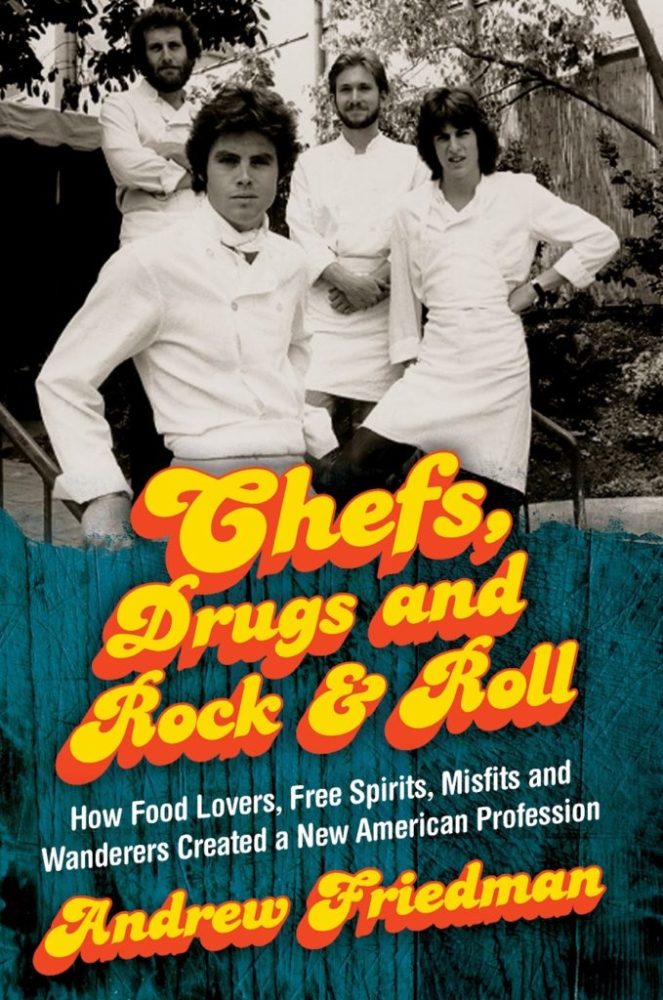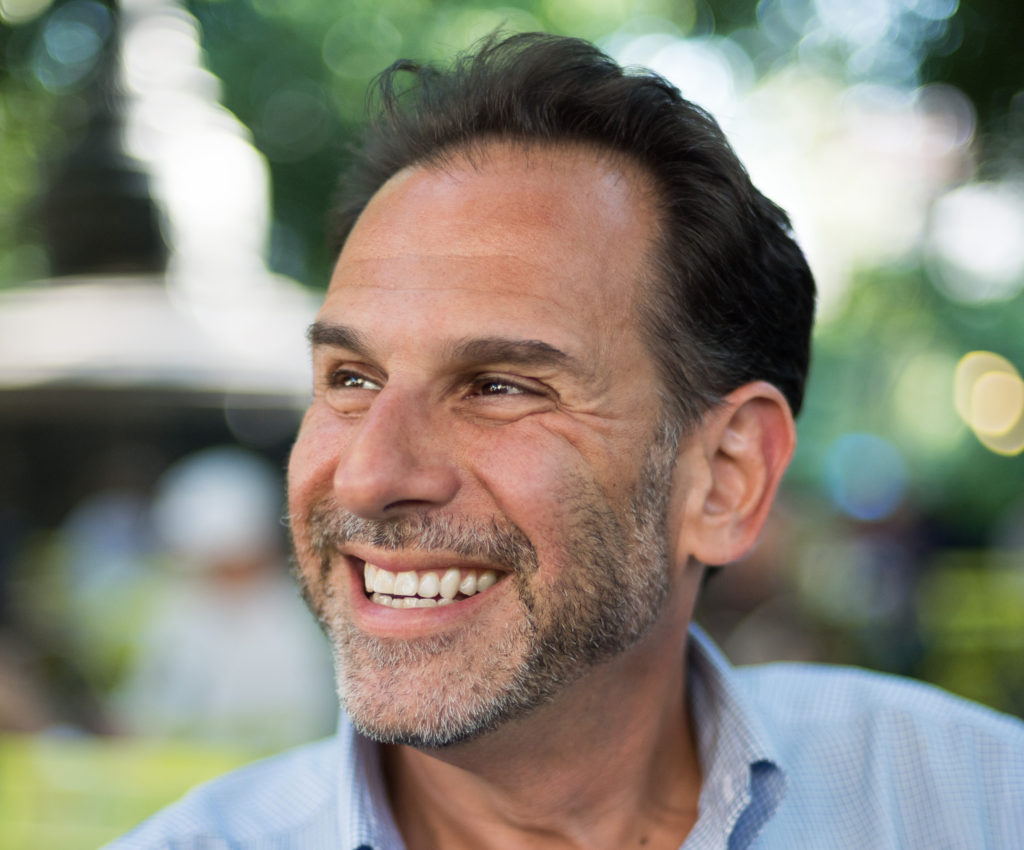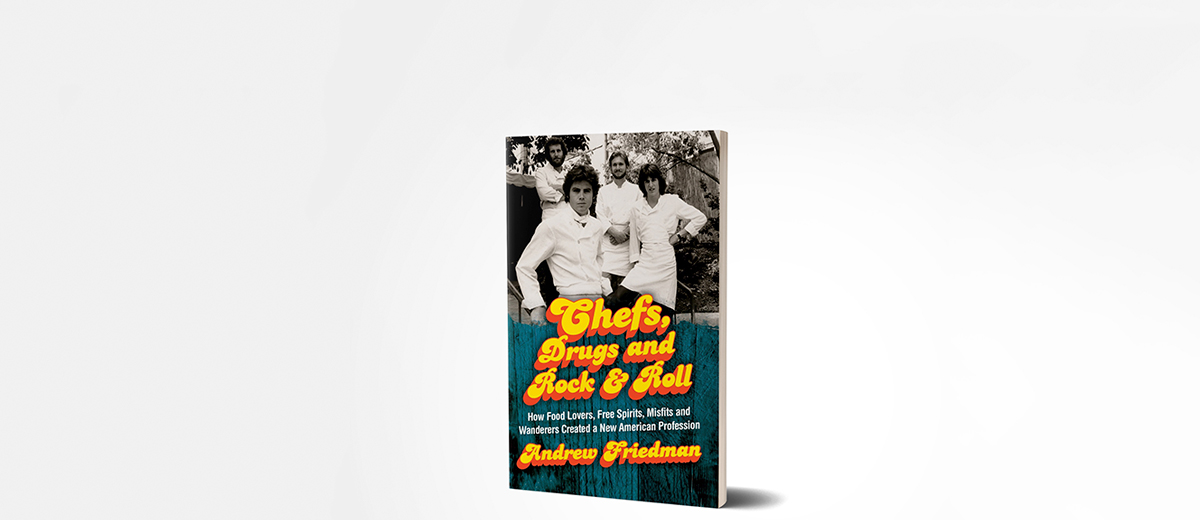We caught up with the multi-talented Andrew Friedman – popular author and podcast host of “Andrew talks to Chefs” about his newest book “Chefs, Drugs, and Rock & Roll: How Food Lovers, Free Spirits, Misfits, and Wanderers Created a New American Profession.” He talks to us about why he is so interested in talking to and writing about chefs, what it is like to hear stories first-hand from greats in the industry, and his views on the “farm-to-table” movement.
-
Have you always been interested in talking to and writing about chefs and the culinary industry? And when did your career in writing about chefs and food begin?
I actually stumbled into the chef world, following stints in the film business and marketing. The marketing gig was supposed to be a “day job” to pay my rent while I tried to write and sell screenplays; but I ended up representing some of the best chefs and restaurants in New York City. Alfred Portale, of the Gotham Bar and Grill, knew I was a writer and asked me to collaborate on his first cookbook. That was about 20 years ago and the rest, as they say, is history.
-
You’ve said you don’t consider yourself a “foodie” but a “chef-ie” – what is it about chefs that draws you in and makes you want to know their stories?
I’ve always been fascinated by what makes people tick, and how passionate people got interested in and pursue their craft. For example, I loved watching Inside the Actor’s Studio and watching documentaries about filmmaking. When I found myself spending time with chefs, in the back of the house that most civilians never get to see, my interest just keep deepening. I also really dig how varied chefs’ paths can be: you can be self-taught, a cooking-school graduate, somebody who learned from your family or in apprenticeships, and still end up at the top of the field. Everybody’s story is unique and I just love that. And that’s before we even get to how they hone their own personal style.
-
Your newest book explores the evolution of the American chef in the 70’s and 80’s. What specifically inspired you to look at the lives and the world of chefs in that particular time period?
Today it’s not seen as especially daring to pursue a career as a chef, but not all that long ago, most people viewed it as throwing your life away. I wanted to tell the story of how the profession came of age in this country—how and why young people were drawn to restaurant kitchens in the 1970’s and 1980’s and how they changed the profession here and American cuisine along with it.

-
You interviewed over 200 industry figures for the book – including renowned names like Jeremiah Tower, Wolfgang Puck, Alice Waters and more. Did you have a particular favorite interview or person to talk to?
That’s a tough one because most of the people I interviewed were so generous with their time and so honest with me. But a few that stand out off the top of my head: I love Jeremiah Tower’s forthrightness; he’s completely unfiltered and that’s increasingly rare today. Restaurateurs Drew Nieporent and Michael McCarty were great for bird’s-eye views of the times and the industry. Mary Sue Milliken and Susan Feniger were very good at putting into words what was going on for them at the time, and by extension for so many young cooks around the country. Clark Wolf, a restaurant consultant, was endlessly entertaining and quotable. I don’t even knows if he knows this, but a lot of chefs who came of age in the 1980s refer to him as “Mr. Sound Bite.” It’s a compliment. The three principals in Wolfgang Puck’s story: himself, his ex-wife and partner Barbara Lazaroff, and his old boss Patrick Terrail were all completely open with me and helped me really understand that part of the story.
-
What was the most exciting or interesting thing you discovered in the process of researching and writing the book?
How brave it was to chuck a college degree, or maybe even a graduate degree, and just start cooking back in the 1970’s. It really was uncharted territory and nobody knew where they’d end up. They were just doing what they loved to do, which was cook.
-
What do you want people who read your book to be able to take away from it?
I’d like for it to be the Roots of pro cooking in America. I want younger cooks and chefs to understand how this world they live and work in was forged, and for anybody interested in food and restaurants to understand what it took to create the world we get to eat in.
-
You also interview chefs regularly for your popular podcast “Andrew Talks to Chefs.” What is the most interesting part of getting to talk to so many different chefs?
Well, for me, the podcast is its own animal. It’s one conversation, often with people I’ve never met before, and I’m a “character” in the finished product. Usually for a book or article, the interviewer takes themselves out of the equation but the podcast interviews are very much give and takes and about a moment in time and hopefully a connection. Most of the episodes are distinct, with their own chemistry, tension, rhythm, and takeaway. I love doing it. It’s my favorite thing to do, actually.

-
The Farm to Table movement in the culinary industry has been growing in widespread popularity – have you noticed many of the chefs you talk to for your podcast implementing sustainable practices in their kitchens and food? Are chefs from certain cities more likely to subscribe to sustainability in the kitchen than from others?
I’m a little funny about the idea that farm-to-table is a newish idea. If you look at the people in my book, Larry Forgione was practicing farm-to-table practices in the late 1970s, and a lot of California chefs were doing it before him, but they didn’t call it that. Sustainability doesn’t come up much in my podcast because the interviews are more focused on biography than the food itself, but I think a lot of chefs today don’t call attention to this aspect of what they do because they consider it a given in the year 2019. I remember a few years ago a Brooklyn chef telling me that a customer asked him why he didn’t use organic ingredients and he said, “I do. I just don’t call it out on my menu because it’s 2000-whatever and this is how we do it now.”
-
Did many of the chefs in the 70’s and 80’s that you cover in “Chefs, Drugs, and Rock and Roll” pursue sustainability or a farm to table concept? And in what ways has this movement grown or changed since the 70’s and 80’s?
I don’t think the word sustainability or the term farm-to-table came up in a single interview for the book but there were definitely chefs who practiced them. Barry and Susan Wine had their own upstate farm supplying produce to The Quilted Giraffe in the 1980’s; the commitment of restaurants like Chez Panisse to foragers and farmers is well documented; and the list goes on. To oversimplify greatly, what’s changed is education and options. So many chefs in the 1970’s and 1980’s were just trying to put their hands on great ingredients however they could—they had to track it down and get it shipped to them, especially in places like the East Coast, with the brutal winters. One of the key developments was the deepening relationships with farmers and farmers markets. Farmers discovered a new customer base in chefs, and chefs found that farmers were willing to grow certain items especially for them. A few chefs were especially important on this front, including the late Jean-Louis Palladin—not an American, but somebody who loved the United States and really helped improve the culinary possibilities here.
-
How important do you feel it is for chefs to practice sustainable practices in their restaurants? And do you think this trend will continue?
I’m no expert, but I think it’s obviously an important consideration. Whether or not I’m bothered when a restaurant goes outside that lane is very much a case-by-case evaluation.
If you’d like to purchase Andrew’s book, click here.


